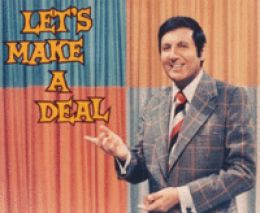|
 "I’m
an overnight success. But it took twenty years." -- Monty Hall "I’m
an overnight success. But it took twenty years." -- Monty Hall
In almost all current poker tournaments, a definite, important poker skill is dealmaking. The prize pools of most tournaments are
extremely top-heavy, with the first two places commonly getting 60% of the total prize pool -- and first prize being twice the second
prize (and four times the third prize). I believe this overly skewed payout structure directly leads to most of the problems that need
to be fixed with tournament poker, but that isn’t the issue here. The point today is: since deals do exist, how do we use that to our
advantage to win more money?
First prize is where the money is in tournaments, but coming in first is not the only way to get that money. You can get a share of first prize money by making a
final table deal. Unless there is something like
a best all-around player award at stake where surviving has unique benefits, a player’s goal should be to be there when the fate of the
first prize money is decided, either by pure poker skills or dealmaking negotiations.
But why make a deal? Why not always just aim to make that big chunk of money your money?
If you play poker for money what you seek to do is get the best of it. In terms of dealmaking there are many ways to do this. Some
players have “no deals” policies. This in itself can be an advantage. If a player knows he isn’t ever going to make a deal, he merely
goes ahead and plays poker, and tries to win, while his opponents may be wasting mental effort on considering deals or trying to
eliminate him so they can make a deal. It’s a small edge, but every small edge helps.
I don’t like deals, but make them when (for one reason or another) I get the best of it. A few years ago I played a Limit Holdem tournament
at the Bicycle Casino. We were three-handed, and I was in trouble. My two opponents each had forty chips. I had twenty chips, and I had
to put eight of those chips in on the big blind. Then like a gift from the gods the player on the button said: “The limits are pretty
high, why don’t we just split the money three ways.” Before I could say anything (like... “Yes!”), the other player said, “Good idea.”
One nanosecond later I agreed, and I was giddy for days afterwards. My opponents were not god-awful players, and even if they were, I
had a two-to-one chip disadvantage and I was being forced to put 40% of my stack in on the blind. There is no way I will turn down an
opportunity to have so much the best of a situation. I got a share of the first place money. That is what I came there for.
Of course, most deal offers are not such no-brainers. There are however many common situations where you can get the best of it in a deal.
Suppose there are best all-around points at stake. If you have a big stack, make a deal for all the money if that stops play, and you
get the added value of the all-around player points. If you are one of the
short stacks, turn it around and say “you
guys will get value from the all-around points, so I want more money.”
Try to make a deal just before you take the big blind. If an opponent tries to make a deal just before his big blind, make him pay for it,
demand more money.
The common “chip count” method of dividing prize pools between several players favors the big stacks (if you don’t see why, imagine a
four player deal, and give one player 80% of the chips and you will see what I mean). If you are a big stack and this method is
offered, be inclined to take it. If you are a small stack, say no. (With only two players the method doesn’t favor the big stack.)
The most effective dealmaking strategy is these words: “I don’t really want to make a deal.” The player most unwilling to make a deal
will very often be able to get a premium -- normally from the player most wanting to make a deal. Even if you desperately want to make
a deal for whatever reason, “bluffing” and pretending to be reluctant will often put money directly into your pocket.
Dealmaking is a poker skill, and some folks are awfully good at it. There should be a shrine somewhere for professional
satellite players at major tournaments.
They live to make three way chops of the equity of the eliminated players, then move on and play another one.
Dealmaking is a fundamental part of the end game of tournament poker -- even if you have a never-make-a-deal policy. There are literally dozens of
ways to “win” in a poker tournament by making a deal. It may not be sexy, it may not look like “poker”, but it is very definitely part of the game,
and if you play tournaments you should work on maximizing your
expectation from this aspect just like you do any other part of your game.
More Tournament Poker Strategy including
Tournament End Games, also
Sponsored Poker Players |

